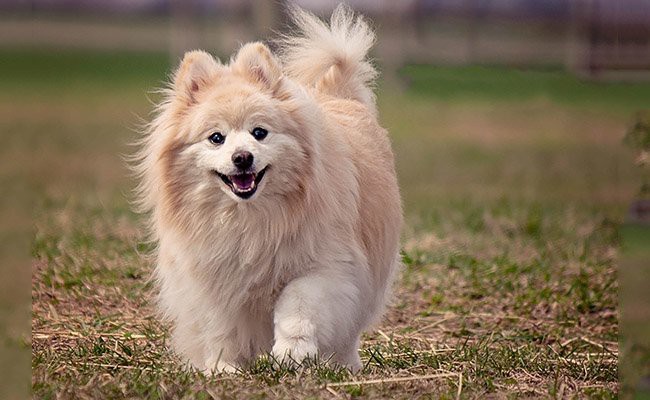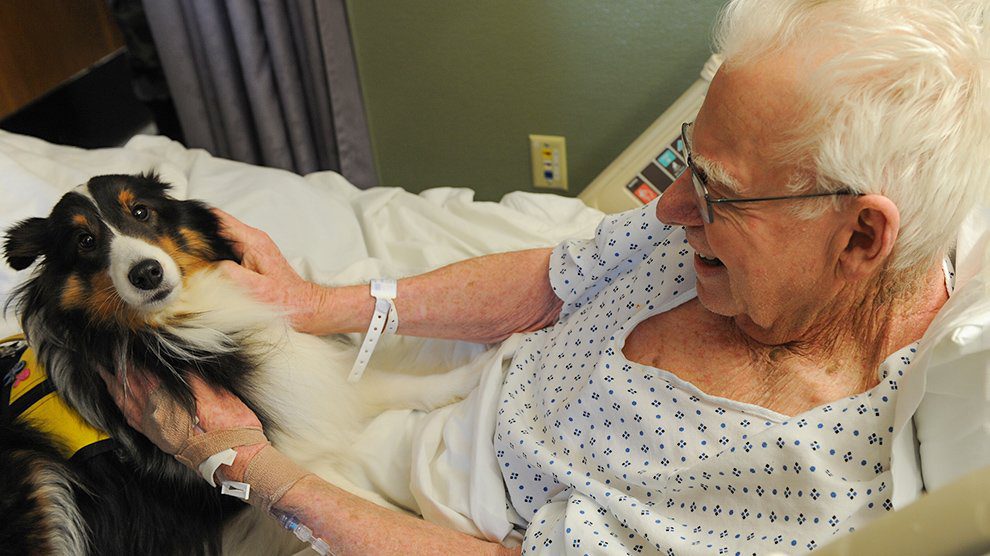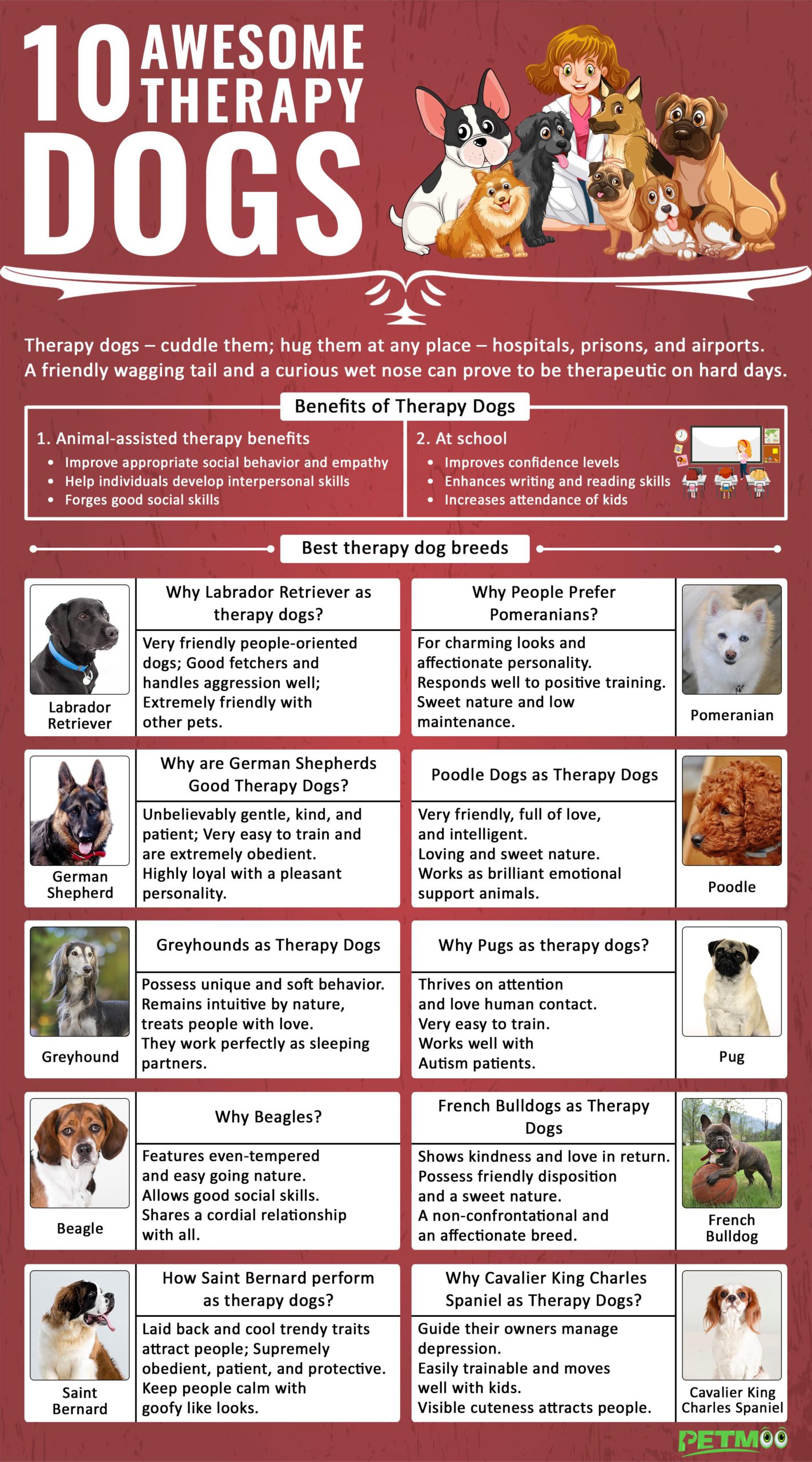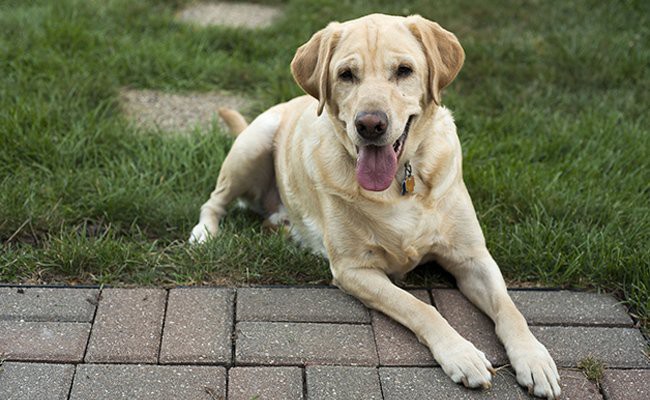Dog Pregnancy Calculator And Timeline
Therapy dogs – cuddle them; hug them at places of your choice – hospitals, prisons, and airports. Especially, a friendly wagging tail and a curious wet nose can prove to be therapeutic on hard days.
Moreover, dogs are far better than humans because they are non-judgmental. In developed nations, therapy dogs make jail visits to improve the mood of inmates.
What Are Therapy Dogs?
In a brief: therapy dogs improve people’s life. These dogs assist different people in various ways. Please remember that therapy dogs are different from service dogs.
Service dog – This type of dog works as an assistant dog and solely improves the lives of its owner to the overall exclusion of others.
Functions of service dogs – These dogs are basically trained to assist individuals suffering from diabetes, mobility challenges, seizure disorders, and hearing problems.
So, we have made your life simple by providing the most endearing therapy dogs of all time.
Labrador Retriever
The Labrador Retriever is one of the most famous breeds in America. Due to their gentle demeanor and intelligence, they make excellent therapy dogs. In addition, they are the number one ranked service dogs.
Why people choose Labrador Retriever as therapy dogs?
- Being people-oriented dogs, Labs try every trick in the book to attract their owner’s attention.
- They are supremely friendly to all other animals and dogs.
- Labs are great therapy assistants and also a family companion
- Known as good fetchers, these dogs handle aggression quite well.
- To sum up, Labs need tons of stimulation and not suitable for those who cannot provide this.
- Due to its size, canine-like Labs also needs more space.
German Shepherd
The German Shepherd, a versatile breed, is known for its intelligence and smartness. Undoubtedly, K9 represents a German Shepherd for most people. Since these dogs are ideal for police work, this enables them to also function like a therapy dog.
Top qualities that make German Shepherd a perfect therapy dog
- They are unbelievably patient, kind, and gentle
- A German Shepherd moves closely with family members but that doesn’t stop them from accepting accolades from strangers.
- Not to mention, wherever they go people love them abundantly.
- In addition, German Shepherds are very easy to train because they are always obedient and eager to please.
- Overall, these dogs are highly loyal with a pleasant personality which favors them to shine as a therapy dog.
Greyhound
When people think about therapy dogs, they seldom pick Greyhounds as therapy dogs. They are affectionate and quiet and in general, excellent racing dogs. Moreover, after a glorious racing career, Greyhounds perform brilliantly as therapy dogs.
Greyhounds as therapy dogs
These agile and slender dogs are mellow. Also, their unique and soft behavior makes them function as supergood therapy dogs. As a matter of fact, these dogs perform effectively too.

Being intuitive by nature, they understand that some individuals require their love and cuddles.
Furthermore, they are highly sensitive and will notice any kind of untoward sound. To sum up, Greyhounds work perfectly as sleeping partners because they normally do not don’t bark.
Beagle
People adore the small dog, Beagle for their brown, white, and black coloration. With floppy attractive ears, they offer more than their well-established cute looks.
Beagles as therapy dogs
- In spite of their easy going and even-tempered personality, when efficiently trained, the Beagles love working as therapy dogs.
- Moreover, their social skill truly shines through as and when they assume the role of a therapy dog.
- These gentle little giants are highly entertaining and active, but they love to cuddle up quite frequently.
- Finally, Beagles share a very cordial relationship even with new people, and new pets, making them a better choice as therapy dogs.
Saint Bernard
This Swiss national treasure, Saint Bernard is highly regarded for its image of being an excellent and helpful avalanche rescue dog. In reality, the picture of a St Bernard featuring a barrel around its neck is embedded in everyone’s visual memory.
How Saint Bernard perform as therapy dogs?
This is a very famous therapy dog breed, while these amazing dogs enable people to tide over tough times. In general, Saint Bernard’s laid back and cool trendy trait pronounce them as feel-good therapy dogs.
Especially, amongst children, they are loved and celebrated for their goofy like looks. In conclusion, Saint Bernard’s are loyally protective, patient, and obedient because they don’t snap or bark when kids pull their tail.
Pomeranian
Firstly, elderly people prefer Pomeranians as they display very good social and friendly behavior. In fact, poms absorb all the care and love they get.
How Pomeranians lovingly exhibit unconditional love?
Even though they appear small in size, these brilliant cute little canines remain calm and pretty laid back around people. Their affectionate personality and charming looks make them a crowd of puller-nothing comes close to petting a real Pomeranian.

In addition, they are a very smart breed that performs well to positive training. And, certifying them as a therapy dog cannot be a problem. Particularly, these breeds display low maintenance and their sweet nature can enable them suitable for the elderly.
Overall, Poms require very little physical exercise but they give a lot of care and affection as therapy dogs.
Poodle
You knew this intelligent pooch was definitely a part of our list. In fact, poodles are one of the well-known that responds quite effectively to training.
Also, these four-legged charmers are fast learners and it’s really quite difficult not to get carried away by their antics.
Why people love poodle dogs?
Poodles, in general, appear in various sizes, and from top size to standard size, waiting to work as therapy dogs.
Moreover, Standard poodles are a better choice, be it the role of watching a seizure alert dog or something else.
They are very friendly, full of love, and intelligent. Furthermore, their loving and sweet nature projects them as brilliant emotional support animals.
In addition, they have curly, thick coats but are normally hypoallergic making.
Overall, Poodles are not suitable for those allergic to dog hair.
Pug
A small sized dog popular for its puppy dog eyes and wrinkled skin, Pug’s sociable and easy going nature creates a therapeutic effect.
Why Pugs as therapy dogs?
As a matter of fact, pugs love thrive on attention and love human contact. Also, these pugs also will not mind as long they are cuddled and pampered.
Furthermore, they are very easily trained and it’s easy to certify them as an effective therapy dog. Overall, Pugs move well with all age groups, and they work exceptionally well with those suffering from autism and neurodevelopment issues.
A small sized dog popular for its puppy dog eyes and wrinkled skin, Pug’s sociable and easy going nature creates a therapeutic effect.
French Bulldog
Known for their bat-like ears, compact, and short frame, French bulldogs are a non-confrontational and an affectionate breed. Moreover, bred from bulldogs, Frenchies are happy to spend time cuddling.
French bulldogs as therapy dogs
Frenchies feed on attention and love and can be a bit handsome for some people. However, they express a lot of kindness and love in return.
Overall, with their friendly disposition and sweet nature, Frenchies act as great therapy dogs, especially with grown-ups.
Cavalier King Charles Spaniel
Apart from their visible cuteness, this dog can also guide their owners to manage depression. Dog Experts call Cavalier King Charles Spaniel as “The Love Sponge”.
A pretty good therapy dog- Cavalier King Charles Spaniel
On top of this, these pups are easily trainable and also move along well with kids.
However, they are also susceptible to other health issues such as heart problems. Overall, before you get those babes, ensure that they can remain healthy and happy.
What Do Therapy Dogs Do?
1. Therapeutic Visitation
In general, dogs which take part in therapeutic visitations are popular amongst owners. These dogs visit hospitals, shelters, community centers, and nursing homes to boost and cheer
Furthermore, their owners are volunteers with a kind heart and take their dogs to these homes to provide some relief. Overall, lifted morale and a much-needed distraction can travel a big way to make people healthy.
Courtroom visits
Certain therapy dogs like yellow Labradors have been employed to lend comfort and courage. These dogs provide great relief in sadness, grief, and loss.
Disaster relief
Irrespective of the nature of the disaster, be it man-made or natural, therapy dogs offer a ray of hope.
Airport visits
Nowadays, many airports across the globe have employed these dogs. The sole aim of this service deals with reducing stress levels and helps those who find traveling overwhelming.
School and hospital visits
They visit libraries and schools to help kids raise their work and confidence in their studying skills. Also, many children practice reading when they are with a dog overlooking the fear of judgment.
2. Animal-assisted education (AAE)
AAT and AAE are not one and the same but both stress upon documented, goal-based, concentrate types of therapy. The dogs used in AAE enable kids to achieve and improve cognitive functions.
Caution – Previously ‘AAE’ was ‘pet therapy’ and is not in use today.
3. Animal-assisted therapy (AAT)
Therapy dogs are usually deployed for AAT work in a more professional atmosphere. In fact, a supervisor oversees and records everything. Importantly, these dogs must be checked and registered with the Delta Society or Therapy Dogs International (TDI).
Moreover, all AAT dogs are trained and are provided with tasks according to the training they have received. AATs are employed by a speech therapist, mental health professionals, social workers, occupational therapists, doctors, and physiotherapists.
Benefits of Therapy Dogs
1. Animal-assisted therapy benefits
- Improve appropriate social behavior and teach empathy
- Assist individuals to develop a wide range of interpersonal skills
- Help build a quick rapport between client and professional
- Forges good social skills to raise social cues connecting human values
2. At school
Recent research shows that therapy dogs at school improve-
- Attendance of enrolled kids
- Confidence levels
- Behavior amongst kids
- Writing and reading skills
However, many schools prefer not to own a therapy dog due to sanitation issues, dog temperament problems and lack of awareness.



























